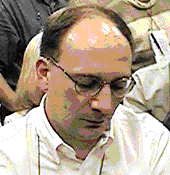
Michael Sandal's book, as reviewed here at Phi Beta Iota (see Review: Public Philosophy–Essays on Morality in Politics) prompted my putting forward some related links and thoughts. I highly recommend Michael Sandal's TED presentation The Lost Art of Democratic Debate
“Democracy thrives on civil debate, Michael Sandel says — but we're shamefully out of practice. He leads a fun refresher, with TEDsters sparring over a recent Supreme Court case (PGA Tour, Inc. v. Martin) whose outcome reveals the critical ingredient in justice.”
Here is a related P2P Discussions on the Future of the Economy.
Sandler's conclusion: “So let's step back from these cases and see how they shed light on the way we might improve, elevate, the terms of political discourse in the United States, and for that matter, around the world. There is a tendency to think that if we engage too directly with moral questions in politics, that's a recipe for disagreement, and for that matter, a recipe for intolerance and coercion. So better to shy away from, to ignore, the moral and the religious convictions that people bring to civic life. It seems to me that our discussion reflects the opposite, that a better way to mutual respect is to engage directly with the moral convictions citizens bring to public life, rather than to require that people leave their deepest moral convictions outside politics before they enter. That, it seems to me, is a way to begin to restore the art of democratic argument.”
A related book to the theme of political decision making: Policy Paradox: The Art of Political Decision Making by Deborah Stone
“Unlike most texts, which treat policy analysis and policy making as different enterprises, Policy Paradox demonstrates that “you can’t take politics out of analysis.” Through a uniquely rich and comprehensive model, this revised edition continues to show how real-world policy grows out of differing ideals, even definitions, of basic societal goals like security, equality, and liberty. The book also demonstrates how these ideals often conflict in policy implementation.” Fostering civil democratic debate is an aspect of why creating tools for supporting “structured arguments” may be so important.
Related links:
“Engelbart on Structured Arguments”
“Structured Evidential Argumentation System”
“Cognitive Expansion with Angler”
See Also:
Journal: Politics & Intelligence–Partners Only When Integrity is Central to Both
Reference: Mobilizing for Effective Decision-Making
Review: Intelligence Analysis – Behavioral and Social Scientific Foundations



